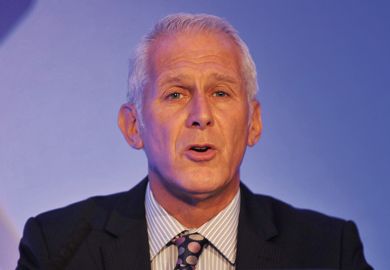The leader of the main UK opposition party has outlined a commitment to the “progressive restoration of free education” – described by one of his MPs as an acknowledgement that scrapping university tuition fees would be “enormously expensive”.
The Labour Party, which held its annual conference last week, faces a potential internal battle over what policy to adopt on higher education and student funding.
Its leader, Jeremy Corbyn, said during his first leadership campaign last year that he wanted to abolish tuition fees – which were trebled to £9,000 in 2012 by the previous government, a Conservative-led coalition – and to reintroduce student maintenance grants at a cost of £10 billion a year.
Following a second successful leadership campaign this summer after a challenge by Owen Smith, Mr Corbyn has been returned as leader.
Some Labour MPs, including Mr Smith in his campaign, back a graduate tax as the best alternative to the current system of tuition fees. Supporters argue that it could achieve the same aims as free education of removing barriers to access and killing off the prospect of a market in variable fees, but at a lower cost to the public purse.
Earlier this year, Mr Corbyn told Times Higher Education that graduate debt in England was an “unfair burden that isn’t imposed by other European countries to anything like the same extent, in some cases not at all”.
In his conference speech, Mr Corbyn reiterated existing Labour pledges to reintroduce grants for poorer students. Although he did not directly mention tuition fees, he said that the 10 pledges he had made in this year’s leadership campaign “will now form the framework for what Labour will campaign for and for what a Labour government will do”.
His leadership pledge on creating a National Education Service says: “We will bring about the progressive restoration of free education for all.”
One of Mr Corbyn’s most vocal critics within the party has been Wes Streeting, a Labour MP for Ilford North and former president of the UK’s National Union of Students.
Mr Streeting said that Mr Corbyn had “picked the right priorities” in his conference speech by focusing on student grants, which would target “those with the greatest need and [would address] the fact that the poorest students in higher education will now be graduating with the highest debts”.
He added that it was “interesting that the wording of Jeremy Corbyn’s pledge talks about the ‘progressive restoration of free education’, because I think there is an acknowledgement, there, that to abolish all university tuition fees and do away with graduate contributions would be enormously expensive.
“My argument is that if we seriously want to make a difference in terms of tackling poverty and inequality and to improve the life chances of those from low- and middle-income backgrounds, then there are far better ways to spend significant amounts of public money than through what would effectively be a middle- and upper-class subsidy by getting rid of tuition fees.”
Saying that he backed “a form of a graduate tax”, Mr Streeting continued: “I intend to get very stuck into the debate about Labour’s higher education funding policy, to make sure that Jeremy doesn’t come unstuck in the way that previous Labour leaders have when it comes to floating ideas around higher education funding; or indeed the terrible position the Liberal Democrats got themselves into, of promising one thing [opposing higher fees] and doing another. It would be a gross betrayal of students to make promises that we can’t keep.”
Paul Blomfield, Labour MP for Sheffield Central, said that a graduate tax could “remove fees and the burden of debt, while maintaining the support that our universities need”.
But he added that the debate “shouldn’t simply be about fees. We need to provide the right financial support, including restoring grants for students from poorer families, with a proper contribution from all the beneficiaries of higher education through general and business taxation.”
Shelly Asquith, who was student coordinator in Mr Corbyn’s 2015 leadership campaign, said that his National Education Service plan deserved “widespread recognition”. She added: “This is finally a clear way forward, after years of Labour’s HE funding policy being neither clear nor popular.
“I would like to see all of the Labour Party get behind Corbyn’s progressive commitments for education funding, and continue mounting pressure on the government for pushing students into further debt and precarity.”
Gordon Marsden, Labour’s shadow higher education minister, said that the National Education Service plan was “progressive in both senses”. It would “encourage social mobility”, but he acknowledged that it was “going to be an accretive process which is going to take quite a long time to develop”.
He stressed that Labour was not “just concentrating on the narrower issues of tuition fees – this needs to be looked at in the overall context of how we expand higher education at all levels, the vocational as well as the academic, and how we have a joined-up [education] policy across the whole period of life.”
POSTSCRIPT:
Print headline: Will Labour back free education plan?
Register to continue
Why register?
- Registration is free and only takes a moment
- Once registered, you can read 3 articles a month
- Sign up for our newsletter
Subscribe
Or subscribe for unlimited access to:
- Unlimited access to news, views, insights & reviews
- Digital editions
- Digital access to THE’s university and college rankings analysis
Already registered or a current subscriber?







